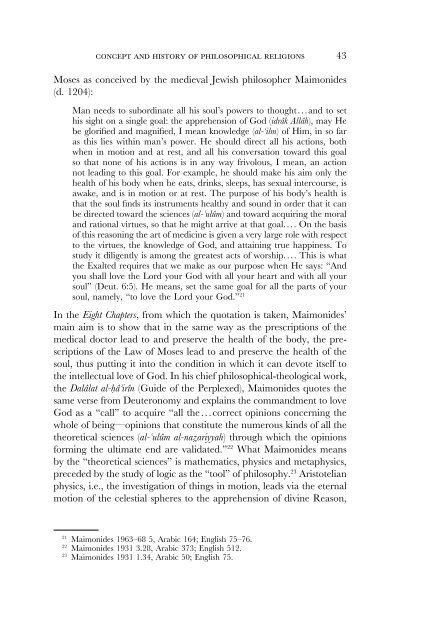Download PDF - Carlos F. Fraenkel
Download PDF - Carlos F. Fraenkel
Download PDF - Carlos F. Fraenkel
Create successful ePaper yourself
Turn your PDF publications into a flip-book with our unique Google optimized e-Paper software.
concept and history of philosophical religions 43Moses as conceived by the medieval Jewish philosopher Maimonides(d. 1204):Man needs to subordinate all his soul’s powers to thought . . . and to sethis sight on a single goal: the apprehension of God (idrâk Allâh), may Hebe glorified and magnified, I mean knowledge (al-ilm) of Him, in so faras this lies within man’s power. He should direct all his actions, bothwhen in motion and at rest, and all his conversation toward this goalso that none of his actions is in any way frivolous, I mean, an actionnot leading to this goal. For example, he should make his aim only thehealth of his body when he eats, drinks, sleeps, has sexual intercourse, isawake, and is in motion or at rest. The purpose of his body’s health isthat the soul finds its instruments healthy and sound in order that it canbe directed toward the sciences (al-ulûm) and toward acquiring the moraland rational virtues, so that he might arrive at that goal. . . . On the basisof this reasoning the art of medicine is given a very large role with respectto the virtues, the knowledge of God, and attaining true happiness. Tostudy it diligently is among the greatest acts of worship. . . . This is whatthe Exalted requires that we make as our purpose when He says: “Andyou shall love the Lord your God with all your heart and with all yoursoul” (Deut. 6:5). He means, set the same goal for all the parts of yoursoul, namely, “to love the Lord your God.” 21In the Eight Chapters, from which the quotation is taken, Maimonides’main aim is to show that in the same way as the prescriptions of themedical doctor lead to and preserve the health of the body, the prescriptionsof the Law of Moses lead to and preserve the health of thesoul, thus putting it into the condition in which it can devote itself tothe intellectual love of God. In his chief philosophical-theological work,the Dalâlat al-âirîn (Guide of the Perplexed), Maimonides quotes thesame verse from Deuteronomy and explains the commandment to loveGod as a “call” to acquire “all the . . . correct opinions concerning thewhole of being—opinions that constitute the numerous kinds of all thetheoretical sciences (al-ulûm al-naariyyah) through which the opinionsforming the ultimate end are validated.” 22 What Maimonides meansby the “theoretical sciences” is mathematics, physics and metaphysics,preceded by the study of logic as the “tool” of philosophy. 23 Aristotelianphysics, i.e., the investigation of things in motion, leads via the eternalmotion of the celestial spheres to the apprehension of divine Reason,21Maimonides 1963–68 5, Arabic 164; English 75–76.22Maimonides 1931 3.28, Arabic 373; English 512.23Maimonides 1931 1.34, Arabic 50; English 75.



